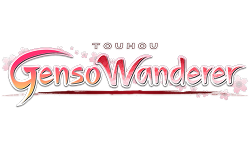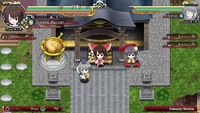|
|

|
PLATFORM
|
PS4
|
BATTLE SYSTEM
|

|
INTERACTION
|

|
ORIGINALITY
|

|
STORY
|

|
MUSIC & SOUND
|

|
VISUALS
|

|
CHALLENGE
|
Hard
|
COMPLETION TIME
|
20-80 Hours
|
|
OVERALL

|
+ Simple, yet challenging roguelike
+ Aimed at Touhou fans
- Nearly non-existent story
- Aimed solely at Touhou fans
- Inconsistent art
|
Click here for scoring definitions
|
|
|
Touhou is a series with a lot of history. From its origins as a one-man hobby project by a bored programmer in his spare time, it's exploded into a minor cultural phenomenon over the past decade. One side effect of its humble beginnings is that the original creator, usually known by his internet handle ZUN, is rather encouraging of fan creativity and has given almost free reign of his potentially multi-million yen IP to whoever wants it, with only a few limitations such as acknowledging him as the original creator. This has led to an explosion of fangames of varying qualities, most of which are also blatant clones of other games for some reason. You've got your Touhou Pokémon, your Touhou Super Robot Wars, and now Touhou Genso Wanderer, a clone of Chunsoft's roguelike, Shiren the Wanderer, made by indie developer Aqua Style. Most of these sorts of games have never been officially translated, for obvious reasons, but recently NIS has been making an effort to make some of them available in English. This is technically the third game in the series, but that hardly even matters because the setting makes almost no sense to anyone unfamiliar with Touhou in general. That's not necessarily a crippling flaw though, with its solid, sometimes challenging gameplay and quirky, offbeat tone reminiscent of the Disgaea series.
The setting is Gensokyo, a small region in the mountains of Japan that's been sealed off from the modern world and is filled with all sorts of ancient Japanese gods and yokai. All of which appear as girls for no particular reason. At the center of this is Reimu, a human shrine maiden of indeterminate age—she looks young, but drinks alcohol—who's tasked with solving any and all supernatural problems these creatures might cause, but more out of a begrudging sense of duty than because she cares. In fact, she's an amusing bundle of minor vices herself, and her apathy towards everything but a chance to get-rich-quick makes it hard for the player to care about the overall plot either. Which is just as well, because it's literally an excuse of a plot: an evil demon possesses one of Reimu's friends and then reshapes the world in very a specific way for no reason other than to justify the roguelike gameplay. Go stop him, and have fun.
Along the way she runs into a lot of old acquaintances, but these characters won't be familiar to most players. While the game uses a cute trick to introduce them by having Reimu be the sort of person who can't be bothered to remember anyone's name, it doesn't do much to characterize them beyond jokes. It's revealed early on that Reimu's first party member Futo is a sage-in-training who has a habit of setting things on fire, but don't expect to be told exactly what a sage is or where she's from. References to Touhou lore are dropped constantly, and even casual fans of the series will likely be confused at times. For example, some of the shopkeepers are a recurring group of nameless background characters from one of the lesser-read spin-off comics. Even the main cast members, other than Reimu, are people who usually don't get much focus in fanworks. Deuteragonist Marisa doesn't even get a speaking role. For better or worse, this is a game aimed at people who already know everything there is to know about Touhou. The translation uses a couple of different names and terms than the accepted fan translations, but it shouldn't be a problem for understanding.
 Reimu with her beating stick.
Reimu with her beating stick.
|
|
Not that other players wouldn't be able to enjoy the game at all. Everything one would expect from a pure roguelike is here: randomized dungeons with dozens of floors, resetting to level one on death, and a pretty good chance of being screwed over by the random number generator. One difference is that there are a multitude of separate dungeons in this game, which are distinguished by completely different rulesets. In some, all items start unidentified, while in others only crafting materials will drop. Or maybe only two handed weapons will drop, or only scrolls and no weapons at all. Those who enjoy the base gameplay will find countless hours of enjoyment here; this is a game that keeps on going long after the credits roll. That said, the game also offers a sense of progression in the form of utilities in town that can be upgraded with money brought back from dungeons, and the main story dungeons generally have the special rule that Reimu can bring equipment collected from previous runs, which changes things enormously.
The gameplay itself is similarly straightforward, yet filled with countless special rules. At the basic level, Reimu just walks around and hits things with normal attacks. It's turn-based in that enemies will move one step for each action taken, and the only available actions are move, hit, shoot, and use item. Reimu's HP recovers for each step taken, and she can run in place, but if she runs out of food she'll begin to starve. She can use ammo she collects from enemies for various ranged attacks: piercing, spread, etc. But the real meat of the game is in the items. Not only is there a dizzying variety of scrolls and limited-use talismans, but even something as simple as bags (called "gaps" in this game; essentially portable holes) offer dozens of powerful permutations, generally by applying various effects on what goes inside them. Reimu can also customize her equipment by fusing it with other armor and weapons to transfer their passive properties. With luck, she can eventually craft an ultimate weapon that's ranged, hits six times per attack, heals her with each hit, and is super-effective against half the enemy types. Or she might get stuck punching things until she finally finds a stick on the tenth floor. Reimu isn't alone either, since she can bring along partner characters with their own levels and equipment. These partners can't be controlled directly, but can be given basic orders like "follow me" or "attack enemies on sight". Instead of using items, they have powerful unique skills, but seem to use them randomly so they're not especially reliable. At the very least they can take a few hits for Reimu though.
She'll need all the help she can get, too, because a lot of the enemies in this game are simply unfair. Mindless clones of other characters from the series, each of them has their own set of special abilities. These range from someone who eats food out of Reimu's inventory before cursing her with a death timer and running away, to someone who can teleport Reimu right up next to her and into a pack of enemies, to someone who will curse literally every item in Reimu's inventory if engaged in melee. Furthermore, there are a large variety of traps randomly placed throughout the dungeons, some of which are minor annoyances, while others will ruin Reimu's day. The average player will likely to want to yell at the screen at some point, but trying to be prepared for the worst is arguably the fun of a roguelike. That said, repeating the easier sections of dungeons near the beginning can get tedious.
 Hope you know who all these people are. And seriously, what's with those ribbons?
Hope you know who all these people are. And seriously, what's with those ribbons?
|
|
Aesthetically, the game uses a high resolution super-deformed anime style that certainly isn't going to push the PS4 hardware to its limits, but looks quite nice for an indie game. Both player characters and enemies have cute and well-animated sprites, and everything looks especially smooth in motion. Weapons and equipment are often exaggerated and silly looking, with the most common kind of shield being someone else's hat, and higher level weapons are increasingly absurd in an amusing escalation. Portraits and other event art are more of a mixed bag though, with some unbalanced character designs—Reimu's ribbon in particular is distractingly huge—and other art that seems needlessly sexualized given the tone of the game. For example, the first loading screen of the game seems to be peering up Reimu's shirt for no reason, which was an off-putting way to start an otherwise lighthearted and fluffy experience. The enemy designs also run into the problem of everyone being a girl. This makes it nearly impossible to tell who is a ghost or a god or a tsukumogami unless the player is already familiar with the characters. Players who haven't memorized the dozens of characters will either need to constantly open the in-game bestiary in order to choose effective weapons and armor, or just try to ignore that mechanic entirely. The default UI is also way too cluttered, but this can be changed in the settings menu.
For music, the game uses remixes of the original Touhou music. Some of them have catchy melodies, but the remixes often make them sound more like generic background music than the originals did. When they don't though, they can seem out of place in the interchangeable dungeons. Why should one floor deserve dramatic music, when it's nearly indistinguishable from the previous floor with relatively dull music? The soundtrack certainly isn't bad, but it isn't a highlight of the game either. The voice acting is available only in Japanese, and is often underwhelming. Other than Reimu, the characters are mostly voiced by either C-list or amateur actors with no major roles to their name. While it's pleasing to see these sorts of people get work, there's a clear lack of experience on either their part or the voice director, because they often fail to make their characters stand out from each other. If it weren't for the actor credits being listed in each character profile, it wouldn't have been surprising to learn that half the cast had been the same person with a decent range.
Overall, Touhou Genso Wanderer is a solid game with no interest in appealing to anyone beyond its niche audience. Devoted fans of Touhou will enjoy seeing some lesser-used characters in action, while fans of roguelikes can easily ignore the story and focus on the challenge of the gameplay. But if you're neither one of those things, it's probably not worth the full price.
Review Archives
|









